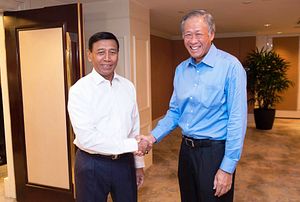On October 11, Singapore’s defense minister Ng Eng Hen met Indonesia’s Coordinating Minister for Political, Legal and Security Affairs, General Wiranto which saw both sides discuss their bilateral defense relationship as well as transnational issues of mutual concern.
With respect of the bilateral defense relationship, the meeting provided both sides an opportunity to discuss following Wiranto’s new appointment as coordinating minister in July as part of Indonesian President Joko “Jokowi” Widodo’s recent cabinet reshuffle. Wiranto is a familiar figure to Singapore and the region, he had served as defense minister and military chief back in the late 1990s. In a post on Facebook, Ng mentioned the significance of this relationship.
“General Wiranto is a good friend of Singapore and knows the SAF well, having started many joint initiatives when he was Chief of TNI and Indonesian Defense Minister from 1998 to 1999,” Ng said. “Good that we have someone of his experience as we tackle together challenges related to terrorism and maritime security.”
According to Singapore’s defense ministry, Wiranto also urged Ng to visit Indonesia. During his visit, Wiranto had also met with other Singaporean officials including Prime Minister Lee Hsien Loong, Deputy Prime Minister Teo Chee Hean, and Communications and Information Minister Ibrahim Yaacob.
In terms of transnational issues, one of the key areas of focus in the meetings was cybersecurity, which is no surprise considering the fact that Wiranto had been in Singapore to participate in the inaugural Singapore International Cyber Week (SICW). Both countries have dedicated growing attention to cyber issues. Last year, Singapore announced it would establish a central agency called the Cyber Security Agency under the Prime Minister’s Office to coordinate national cyber security efforts threat (“Singapore’s Cyber War Gets a Boost”). Indonesia has also been mulling a similar move as well (See: “Does Indonesia Need a New Cyber Agency?”).
In his address at SICW, Wiranto highlighted Indonesia’s role in the establishment of cyber norms as part of the United National Group of Governmental Experts but also emphasized several measures that Southeast Asia could take to enhance regional cooperation, including boosting joint investigation capacity and digital forensics in law enforcement agencies and appointing a point of contact to oversee cybercrime.
Another major issue discussed by both ministers was terrorism. That is no surprise given shared concerns about the rise of the Islamic State and its threat to Southeast Asia, made clear by the Jakarta attacks which occurred back in January. In August, Indonesia also revealed that it had arrested six suspects in Batam who were planning a rocket attack on Marina Bay in Singapore.

































